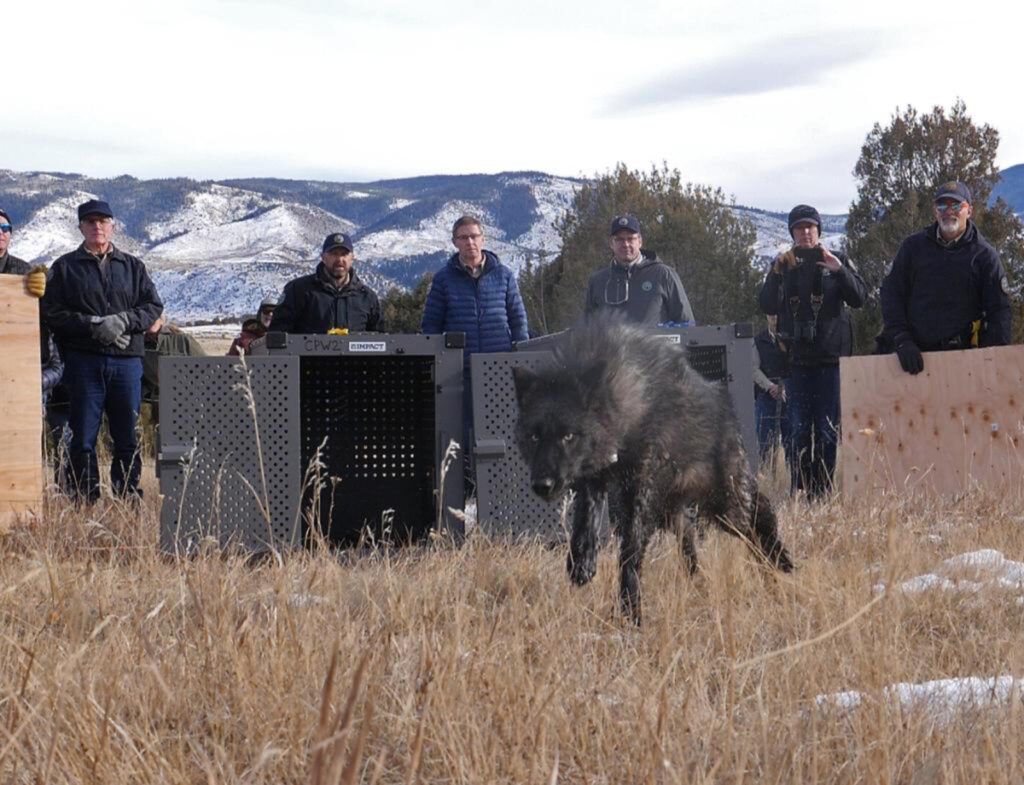Update: Gov. Jared Polis signed SB 25-038 into law on Thursday, March 20.
By Jeffrey A. Roberts
CFOIC Executive Director
A bill that shields the identities of people who seek and get state compensation for property damage caused by wildlife is headed to the desk of Colorado Gov. Jared Polis.
Proponents say Senate Bill 25-038 is needed to protect ranchers from harassment when gray wolves kill their livestock, although the bill grants confidentiality to all claimants under Colorado’s wildlife damage program.

Sen. Dylan Roberts, the Dillon Democrat who introduced the measure, told fellow lawmakers in a committee hearing that ranchers are “wary of filling out a claim for compensation that they are legally entitled to.”
They’re afraid, he said, of their names and addresses being made public through Colorado Open Records Act requests made by “a pro-wolf individual or organization who then would want to show up at their property, maybe to see a wolf, but more nefariously to give that rancher and agriculture producer a hard time about not taking care of their animals, which is completely unacceptable.”
The bill passed the legislature with only one member — Rep. Bob Marshall, D-Highlands Ranch — voting against it.
Colorado Politics reported in late February that the Colorado Parks and Wildlife Commission is reviewing more than $343,000 in claims submitted by ranchers for damage caused by the reintroduction of gray wolves into the state. The commission also is reviewing $100,000 in claims for damage caused by bears and elk.
Under SB 25-038, the name and other personal information of a person who files a claim with Colorado Parks and Wildlife would not be subject to disclosure under CORA unless a claimant “takes actions or makes statements that lead to the person’s personal information becoming publicly known.”
The bill says “nothing prohibits the disclosure” of non-identifying county-level data highlighting: the number or dollar amount of claims made to CPW; the number of settled claims; the monetary amount of settled claims; the number of claims made that are pending; and the number of claims made that were denied and the reasons for denial.
The agenda for the March 5-6 meeting of the parks and wildlife commission lists the names of those whose recent damage claims are recommended for approval or denial. But in testimony before the House Agriculture Committee on Feb. 26, CPW officials said the names of claimants are not provided in response to CORA requests. “The bill more or less codifies existing practice for our wolf damage program in that we already do not provide this personal information for wolf claims,” said Reid DeWalt, CPW’s deputy director of policy.
CORA manager Jason Isenhart told the committee that, “once a claim is paid, we also have a statute that allows us to withhold some information … and the names would be part of that. So, we aren’t doing it purely based on policy per se. There is statute underlying what we’re doing.”
While CORA allows the withholding of email addresses, phone numbers and home addresses provided by a person to a state agency, the Colorado Freedom of Information Coalition wanted to know the provision Isenhart referenced that allows the withholding of claimant names.
It was Colorado Revised Statutes 24-72-204 (2)(a)(IX), according to agency spokesman Travis Duncan. That CORA exception concerns “records of ongoing civil or administrative investigations conducted by the state or an agency of the state in furtherance of their statutory authority to protect the public health, welfare, or safety.”
Attorney Eric Maxfield, a CFOIC board member, said the exception is “designed to protect the names of targets and witnesses in an investigation that is ongoing or that is concluded with no determination of wrongdoing. It is meant to protect individuals from publicity who have been investigated and cleared by dismissal. It is not designed to protect the names or other recorded information of individuals where the investigation is concluded and there is agency response or discipline.”
CFOIC raised concerns about SB 25-038, testifying in a Senate committee hearing that “there should be transparency to prevent and reduce the risk of abuse and fraud” and “completely hiding the identity of the person receiving funds makes scrutiny and accountability much more difficult to achieve.”
In the House committee hearing, Ryan Sedgeley with the Endangered Species Coalition said the bill “undermines transparency and public oversight of the entire game damage program.”
“We want this process to keep working well, and public oversight is important to make that happen,” he told lawmakers. “It’s also just good, transparent governance to know how taxpayers’ money is being spent. Secrecy is not the answer when Colorado taxpayers have gone to great lengths to ensure that property owners and agricultural producers are generously compensated for damage done by wolves and other covered wildlife species.”
Follow the Colorado Freedom of Information Coalition on X or BlueSky. Like CFOIC’s Facebook page. Do you appreciate the information and resources provided by CFOIC? Please consider making a tax-deductible donation.




